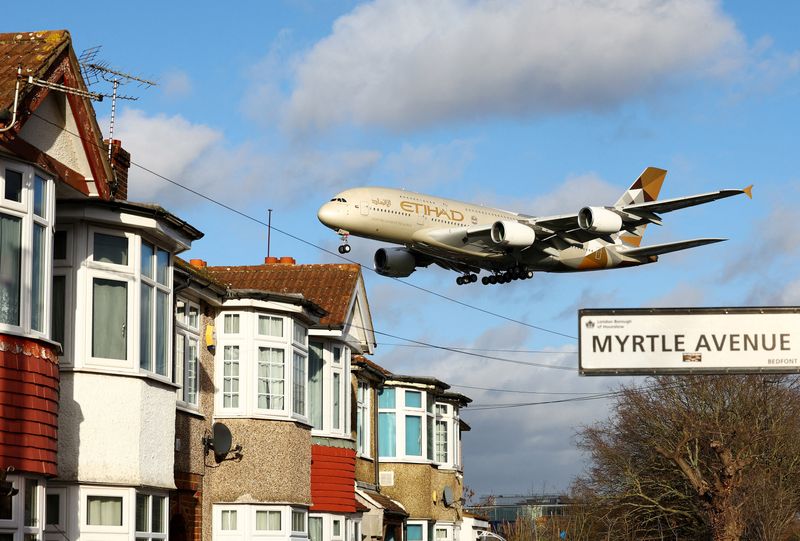By Federico Maccioni, Hadeel Al Sayegh and Andres Gonzalez
DUBAI/LONDON (Reuters) - Etihad Airways and flynas are gearing up to list on local stock markets this year, marking the first IPOs by Gulf carriers in nearly two decades, with Etihad sounding out investors next week ahead of a potential sale of around a 20% stake, two sources said.
Etihad is looking at a listing this quarter, the people with knowledge of its plans said, with one of them saying the airline would target both local and international investors.
It could raise around $1 billion in what would be the first airline IPO in the Gulf since Kuwait's Jazeera Airways in 2008, one of the two people and a third source said.
Saudi Arabia's budget carrier flynas, backed by Kingdom (TADAWUL:4280) Holding, the investment company of billionaire Prince Alwaleed Bin Talal, could also list this year, another person familiar with its plans said.
Qatar Airways, one of the region's biggest carriers, could go public before the decade is out.
The four people declined to be identified because the plans are confidential.
Etihad, and its owner, Abu Dhabi's sovereign wealth fund ADQ, declined to comment. Flynas did not respond to a request for comment.
Kingdom Holding's CEO told Saudi state-owned broadcaster Al Arabiya TV on Wednesday that the company was in the final stage of getting approval from the Saudi market regulator to list in Riyadh.
Flynas is worth at least $2 billion, Prince Alwaleed posted on X earlier this month.
Dubai's Emirates has also previously been flagged as a potential IPO candidate. Its chairman and chief executive Sheikh Ahmed bin Saeed Al Maktoum told reporters last year that an IPO was not his decision to make and that this would be a Dubai government decision and he would go ahead if asked to do so.
TOURISM
The potential listings are driven in part by the local governments' efforts to diversify their economies away from oil, betting on sectors like tourism as international travel revives after the pandemic.
The IPOs would allow investors to access a market with significant growth potential, aviation analyst John Strickland said, citing hub capability due to a geographic location between Europe and Asia, plus Dubai's attractions as a tourist destination.
Dubai is already a major stopover point for long-haul flights after overtaking Heathrow as the world's busiest airport for international traffic a decade ago.
Etihad has been through a multi-year restructuring and management shake-up after investing billions of dollars to compete more effectively with Gulf peers by buying minority stakes in other carriers.
The launch of a multibillion-dollar new terminal at Abu Dhabi's Zayed International Airport in 2023 tripled the hub's annual capacity to 45 million passengers and could help the airline's growth plans.
Etihad has said it is working to expand destinations to more than 125 airports by 2030 from more than 90 today and boost its fleet under a plan to bolster the role of the UAE capital as a travel hub connecting Asia and Europe.
"Markets are vibrant, valuations (for regional companies) are high," said Mohamed Ali Yasin, founder and CEO of investment consultancy firm the Oracle (NYSE:ORCL) Financial Consultancy and Investments.
In Saudi Arabia, where tourism is a major pillar of the Vision 2030 economic overhaul, the nearly 20-year-old flynas is planning to expand its fleet to more than 160 aircraft by 2030 from over 60.
Despite local competition from the likes of low-cost player flyadeal, flynas has all the credentials to grow further, Strickland said, citing the size and potential of the Saudi market backed by a young, growing population.
The Middle East, which had a 9.4% share of the global air passenger market in 2023 - calculated as revenue per kilometre - had an 8.7% increase in demand in November 2024 compared to the same month a year earlier, according to IATA.
Other regions still accounted for larger shares of the overall market, with Asia Pacific topping the list with a 31.7% share, according to the data.
BRIGHT SPOT?
The Gulf accounted for the vast majority of the 54 IPOs in the Middle East and North Africa in 2024, which raised $12.2 billion, up 12% from a year earlier, according to LSEG data.
The Gulf listings could become a bright spot for investors in an airline sector that has faced problems in other regions, including Europe, where airlines, such as Lufthansa, have struggled with plane delivery delays, engine troubles, labour disruption and surging costs.

"Coming out of COVID, some of the Gulf carriers were amongst the first ones to really start recovering and get the market going again," Strickland said.
Europe "is tied up in regulation, climate change focus, even changes, of course, in the political landscape."